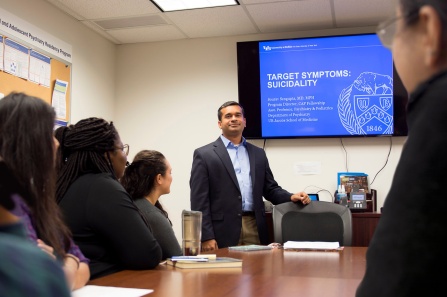Didactics

“Our didactic curriculum helps our fellows make connections between fundamental clinical neuroscience and day-to-day clinical practice. We really take a ‘neurons-to-neighborhoods’ approach," says Sourav Sengupta, MD, residency training director in child and adolescent psychiatry.
In our fellowship, you’ll benefit from didactic curriculum that combines best practices from the field of education with principles of adult learning.
We begin each training year with an intensive weeklong course to give you the tools you’ll need as you begin your fellowship training. From there — and throughout your two years of fellowship — we hold didactics each Wednesday.
Our Comprehensive Approach to Didactics
Our didactic components are structured to provide you with thorough instruction in all areas of the field, so our units begin with coverage of the foundations of child and adolescent psychiatry, shift to the early years of child development and then cover school-age children, adolescence and early adulthood.
Additionally, we have included specific units for genetics, fear and anxiety, inhibition and disinhibition, cognition, higher functions and sexuality.
Within each unit on a given Wednesday, the morning consists of:
- seminar on normal development with a focus on neurobiology and normative development
- seminar on abnormal development
- group psychotherapy supervision session
- psychopharmacology session
To help you solidify your understanding of each unit, we center all sessions around a common theme. For instance, when you learn about the neurobiology of attachment in our neurodevelopment series, the next hour’s lecture may be on maternal-child attachment problems, followed by seminars on ways to approach these issues through different treatment modalities.
Afternoons are used for case conferences, research literacy, resident wellness, program engagement and our innovative experiential learning sessions, which create meaningful and reciprocal connections between our program and the local community organizations that serve our patient population. Our resident wellness sessions give you opportunities to find strategies — useful during fellowship training and throughout your career — that help you relax and unwind.
Additionally, our fellows report that our didactic curriculum has enhanced their research literacy.
Going Beyond Rigorous Curriculum
Our dedication to providing you with effective training doesn’t stop with our didactic curriculum; we’re also committed to ensuring that our teaching faculty members are always perfecting their instructional skills.
Many of our lead instructors have completed training through the UB Royal College of Physician Educator Program, which is designed to examine instructors’ current teaching methods, teach techniques specific to medical education and improve educators’ performance in the short and long term.
Our program also employs a master’s-level educator to provide instructors with educational sessions and personal mentorship involving:
- lesson planning
- teaching and learning
- best practices in education
Upcoming Events
8:00 am - 9:30 am
Online / Zoom
8:00 am - 9:30 am
Online / Zoom